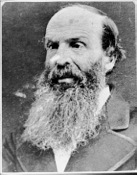
I’ve been asked about the connection between “belligerent evangelism” — the 19th century kind that may have been practiced by Presbyterian missionary, Henry Spalding — and the monstrous issue of “commercialism and the commodification of the Gospel” that may or may not plague the North American Church today. With this in mind, let the unsuspecting reader beware, there is a polemic afoot in the following reflection which attaches itself like the strands of a spider web to philosophers, theologians, poets and other thinkers who are important to me.
I’ll be shooting out easily severed threads from the positions of these more solid beams and joists:
- Soren Kierkegaard who posits, “From generation to generation ‘Christendom’ is a society of non-Christians;”
- Jacques Ellul, for whom “we are no longer confronted by individual sins but by the state of sin of humanity;”
- Simone Weil, as she claims “there is no such thing as a holy nation;”
- Wolfhart Pannenberg, in his emphasis on “spirit” as both “transcendent” and “immanent;”
- Walter Brueggemann, when he argues, “Hope that moves beyond a claim of privilege requires an emptying of an exclusionary posture that is linked to absolutist readings;”
- and finally Annie Dillard, who famously says, “On the whole, I do not find Christians, outside of the catacombs, sufficiently sensible of conditions…”
And so, where to begin?
Well, to begin I point out what may be obvious to some; I am no historian.
Henry Spalding is a cobweb to me. A name on a dusty page, and far from the exhale of this breath at this moment.

These three items alone don’t amount to much more than a sketch. Others may want to fill in the blank spaces between them. But a sketch, I maintain, is all we’ll even really have of anyone who endeavors to communicate a message of supreme-spiritual significance. That is to say, the question of our motivation matters a great deal. If our motivation is to gather a larger crowd so that we don’t feel so alone in the faith, I wonder about that motivation. If our motivation is to win an argument, and to build a reputation for having converted many to Christ, I wonder about those inner-thoughts as well. And, of course, there’s no way of ascertaining a missionary’s true intentions, and chances are, they are always mixed at best. We may be genuinely fascinated with, and concerned for, those individuals with whom we are sharing “God’s mighty deeds,” and assume that each individual who comes to faith will be better off. But maybe not.
I submit a portrait of Spalding like I do a portrait of myself every day and every night, and perhaps the most authentic means of sharing that portrait is to stress how it is unfinished. Moreover, I may have no clear picture of who God is calling me to be, and what if I admit that? What if I present myself to the Nez Perce and to so many others like this: “Lord, I believe; help my unbelief…”?
To me, this is the essence of evangelization: we go into our conversations with others, and we behave as Francis of Assisi suggested, “we preach the gospel and if necessary use words,” but we do all this as fellow seekers, with our ears and hands wide open.
And yet, let’s be honest. The monstrosity in which we live and move and have [most of our] being today is one of product and productivity. Evangelization of the peoples in 2014 faces the challenge of corporate commodification.
What I mean by that phrase is the reduction of what absolutely cannot be valued on the open market to something that can be valued on the open market. I mean, if the angle a contemporary Christian takes is similar to that of Spalding in the 1830’s, that person aspires to make the biblical world view relevant. That person aspires to show how becoming a like-minded believer will meet needs, and these needs include everything that Abraham Maslow mentioned under the rubric of Self-Realization. We have needs for the basics of food, clothing and shelter… well, our church can help with that. We have needs for the security of home and family… same deal. We have needs for love and belonging… look no further. We have needs for respect and achievement… join a committee, serve on a board… We have needs for a strong moral structure and opportunities to create… ah, our small group programs are top notch… our mission projects change lives.
Now, if all this meeting-of-needs sounds good to you, it should. It makes sense. It makes a lot of sense, and if we accept it as the preeminent world view, we will have a place in the world, no questions asked.
My thesis, however, is that we’ve sold out. And we’ve sold out where it matters the most, which is in arena of our Embodied Relationships.
Think for a moment about thinking. Why do we think? Is it really for the purpose of getting something done? Accomplishing a goal that we’ve set for ourselves? Or a goal that we imagine God has set for us? My suggestion is that we think most often and most deeply about our encounters with others, how wild and unwieldy they are. And the problem of bureaucracies and administrative practices remains their inability to grasp this fact: we are mysteries to one another, and not a means to some other end.
Think for a moment about feeling. Why do we feel? I know many people who would rather not feel a thing. We anesthetize. We numb ourselves with drugs, alcohol and entertainment. We tame and train our feelings. We don’t want to expect too much and suffer the disappointment. And perhaps the biggest issue we face with our emotional lives is the fact that we are meant to feel passionately, but can’t seem to locate the object of these passions. What’s object “under the sun” is worthy of our most earnest affection? Is it dogma? An institution? The communities of family, church, synagogue, mosque, coven or nation? Come on. Let’s be honest. That Truth (?) to which, or to whom, we’re meant to direct our love and devotion can’t be named. It slips through our greasy fingers and toes again and again and again.
I began this piece with the intention of making more explicit the connection between a harsh mode of religious proselytizing and a Christian message that is made, I think, too palatable among the connoisseurs of spirituality today. That’s the way I began, and I hope, by this sentence, that I’ve caught at least some (gad)flies in that web.
If I haven’t, these closing paragraphs won’t help. But here they are nevertheless.
Christian Wiman’s book, My Bright Abyss; Meditation of a Modern Believer, has really rocked and reconciled my worlds. His words, as a vulnerable believer, provide a more detailed sketch of where I hope all missionary endeavors will go in the future:
It is not some meditative communion with God that I crave. What one
wants during extreme crisis is not connection with God, but connection
with people; not supernatural love, but human love. No, that is not quite
right. What one craves is supernatural love, but one finds it only within
human love. This is why I am, such as I am, a Christian, because I feel
God only through physical existence, can feel his love only in the love
of other people. I believe in grace and chance, at the same time. I believe
in absolute truth and absolute contingency, at the same time. And I believe
that Christ is the seam soldering together these wholes that our half-vision–
and our entire clock-bound, logic-locked way of life–shapes as polarities.
You see, as I contemplate Thunder Eyes along the banks of the Lapwai C
The trajectory of this Answer-Man-Ideology can be traced all the way to Joel Osteen and Creflo Dollar. They may not be mean; but they sell conformity and prosperity with a manipulative flair that would have made Spalding darkly proud. Now, look again.
There’s an adventurous dialogue going on right under their polished (and perhaps pierced) noses.








